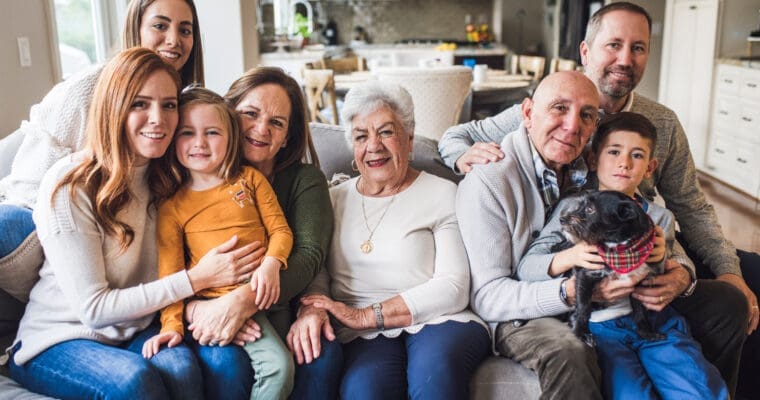One of our most influential and often longest-lasting relationships is with our siblings. Our relationships with them are significant to our development. As our family structure members linked by marriage or bloodline continue to change in the United States, the attachment to our siblings can be more impactful than the attachment to our parents. Positive sibling attachment reduces the risk of anxiety, depression, and aggressive behavior. In addition, siblings with healthy attachment are more confident and develop a positive self-image. The nature of our relationship, whether positive or negative, strongly affects our psychosocial development, is essential during emerging adulthood, and influences our romantic relationships (Kumar et al. 2015).
When looking for love, one might be looking for a partner who shares your values and has had similar experiences. Still, sibling relationships and birth order might not be something one thinks about when finding the origins of these things.
Impact of Our Family Systems
According to the U.S. Census Bureau (2023), most Americans have at least one sibling, and this relationship develops within the family system. Bowen’s Family Systems Theory stresses that the family is a complex emotional unit and its central concept of differentiation of self. Differentiation is the ability to have your own opinions and values outside of your family’s while remaining emotionally connected to your family. Our family influences our development; the more differentiated we are, the less impact they have on our functioning and the less we attempt to control them. In other words, we can maintain our emotions when stressed while continuing to connect with our family members (Calatrava et al., 2022).
In the context of my own life (Bella), I am in the process of becoming differentiated. I have been taught many values and opinions through my family, and these values are different for me compared to my siblings since I am the oldest. I have been taught to take care of my family at all costs. This role has made me incredibly emotionally attached, almost to a fault. Although I am doing the work now to become more differentiated, I am seeing how my brothers are not having to do the same. As the oldest, I took on the brunt of these family influences, which have played a role in my romantic relationships.
Our sibling relationships are affected by different factors of our family structure, including family size, age difference, gender constellation, and birth order, with each contributing to our sibling relationships in different ways. However, our focus will be on birth order.
Birth Order and Psychological Birth Order
Birth order is where a child falls in their family compared to their siblings. These include first born (oldest), middle born (middle child), last born (youngest), and only children. Alfred Adler’s birth order theory proposes that a person’s personality is associated with their birth order. Nevertheless, no two families are the same, and birth order is the totality of your family’s influence on your personality (Leman, 2001). Therefore, complications arise when we attempt to put individuals and families into a one-size-fits-all box. Our parents’ birth order and their relationship shape the family. Family dynamics change with the birth of each child (Leman, 2001), and our relationship with our siblings influences the family (Van Volkom et al., 2017). Each aspect influences our connectedness within the family and in our romantic relationships.
Have you ever been in the dating scene and thought to yourself, “I’ll never date another only child”? Although specific and maybe silly sounding, this is a thought I (Bella) have had. Being the oldest of 5, I credit many of the people I am today to my role in my family. Having siblings as close to age as me, 13 months apart and as far as 20 years apart, is something I never thought would impact me, but it has. That being said, I believe my role as the oldest has made me a leader, a peacemaker, and very mature for my age.
There is a difference between birth order and psychological birth order. Birth order refers to the location in a family and is identified as the oldest, middle, youngest, and only child. Psychological birth order is how a child perceives themselves and their location in the family (Adler, 2007 pg. 341), which may explain why a person does not fit the profile of their birth order (Hartshorne et al., 2009). For instance, birth order can be reshuffled depending on sibling deaths, adoptions, illness, or the blending of families due to death or divorce. Additional contributing factors include the number of siblings, gender constellation, age spacing, and physical, mental, or emotional differences (Leman, 2001). Family dynamics affect our relationships with our siblings, and these variables affect our sibling relationships differently. Leman (2015) clarifies that all birth orders have specific trends and characteristics and that the “key to understanding birth order is identifying and examining the dynamic, fluid relationships between family members.” Birth order influences our identity formation as we become emerging adults as we decide our role in life and how we will fulfill that role (Van Volkom et al. 2017).
Shaping our Personality
Our personality is affected by the psychological imprint during early childhood by our parents, their parenting style, and our attachment style. Our parents and siblings will be the most intimate relationships in our lives (Leman, 2015). Our sibling relationships strongly affect the formation of our social identities because we make sense of who we are based on the similarities and differences of our brothers and sisters and the way other individuals compare them (Davies, 2015). When we are younger, positive interactions with our siblings help us navigate social interactions and learn how to share, communicate, and problem-solve. We also develop empathy and affection; our birth order influences sociability, dominance, and assertiveness (Van Volkom et al., 2017).
Shaped by our genetics and environment, our personality is molded by our birth order. First-time parents are stricter than with future children, have higher expectations, and are more anxious, making firstborns goal-oriented, independent, and perfectionists. As siblings are added to the mix, firstborns play a surrogate role in the family, often helping care for their younger siblings. Firstborns are generally well-organized, conscientious, and natural leaders, and each sibling that follows is influenced by the sibling above and models their behavior according to what they absorb. The middleborn is contradictory. They have the firstborn to look up to and will compete with them or go in a different direction. They can be pleasing or antagonizing, competitive or easygoing, the rebel or peacemaker. Middle children are also the most secretive of the birth orders. They are prone to being independent and mentally tough because they’ve learned to cope with feelings of rejection and being a fifth wheel growing up, often feeling like they don’t belong at home. Lastly, lastborns are outgoing, charming, attention seekers and get most of their instruction from their siblings because their parents are tired by this point (Lehman, 2009).
Sibling Interactions and Future Relationships
Positive sibling interactions encourage the ability to create and maintain a romantic relationship, and our belief that we can be a healthy romantic partner is affected by our sibling relationships as we become emerging adults (Van Volkom et al. 2017). The Robertson et al. 2014 study also highlighted power within sibling relationships and how that plays a role in future romantic relationships. According to their findings, the oldest and youngest siblings perceived the oldest as having more power. This ties into attachment because, according to Bowlby, attachment involves the individual seeking closeness to who is perceived as a stronger person. Regarding this specific study, this means that the youngest would have more opportunities to obtain attachment figures, making them more comfortable and secure within themselves and their emotions. This might help explain why their study found that participants who were the younger siblings rated their relationships as more satisfying compared to the participants who identified as the oldest. (Robertson et al. 2014). There are many other reasons why the youngest sibling tends to have more security in themselves. Nevertheless, their role as the youngest contributes to their abilities to connect, communicate, and process their emotions. These learned skills can make a significant impact on their romantic relationships down the road.
In my personal experience (Bella), in dating someone with a different birth order (only children), I found myself not connecting to them, not wanting the same things, and having a lack of understanding in my love and prioritization of my family. This led me to form a blanket assumption about only children, ultimately making me think I could never be with someone like that. Since I have grown and met my current partner, I have learned how wrong my assumptions were. Although birth order does matter, it doesn’t have as much impact as I assumed.
I (Bella) have thought about relationships and compatibility quite a lot through seeing family members and friends go through relationships and my own. I was sure I was correct in my assumptions about dating and birth order, but if I had kept that mindset, I would have never met my current partner. My current partner is family-oriented, kind, patient, and shares many of the same values as me despite having a significant difference in placement in his family. I would have missed this incredibly healthy and loving connection if I had stuck to my stubborn assumptions.
So, how does this affect our romantic relationships? This is where the conflicting research happens. Dr. Leman believes, in general, that you should not choose the same birth order partner but should look for a complimentary birth order, which includes only the youngest, firstborn, and youngest, or middle and youngest (Leman, 2007). However, Hartshorne et al. (2009) claim that “birth order appears to be a reliable factor for determining the formation of long-term relationships, with people of similar birth orders forming close platonic and romantic relationships with other people with the same birth order.” Lastly, Raetz (2011), with Prepare/Enrich research study on birth order and couple satisfaction, found that birth order did not significantly affect marriage satisfaction.
On the other hand, Robertson found in their study that there was no evidence of a correlation between sibling relationship quality and future romantic relationship quality (Robertson et al., 2014). Several reasons for this conclusion were given to explain why these results were found, so more research must be conducted to get a solid consensus.
Understanding our birth order’s impact on our personality can influence our interpersonal relationships and help us have healthy connections. Birth order and the psychological effects are valuable tools for self-reflection and self-awareness, which can only benefit us and our relationships by understanding our strengths and weaknesses and being aware of our partner to love them so they can feel the most loved (Leman, 2001).
References
- Adler, A. (2007). Position in family constellation influences lifestyle. Readings in the theory of individual psychology.
- Calatrava, M., Martins, M. V., Schweer-Collins, M., Duch-Ceballos, C., Rodríguez-González, M. (2022). Differentiation of self: A scoping review of Bowen Family Systems Theory’s core construct. Clinical Psychology Review. Volume 91. 102101. ISSN 0272-7358.
- Davies, K. (2015). Siblings, Stories and the Self: The Sociological Significance of Young People’s Sibling Relationships. Sociology, 49(4), 679-695.
- Hartshorne, J. K., Salem-Hartshorne, N.., Hartshorne, T. S. (January, 2009). Birth order effects in the formation of long-term relationships. Journal of Individual Psychology 65(2)
- Kumar, A., Thomas, S., & Deb, S. (2015). The dynamics of sibling relations in adolescent development: Understanding the protective and risk factors. Indian Journal of Positive Psychology, 6(4), 439–443.
- Leman, K. (2001). The birth order connection: Finding and keeping the love of your life. Grand Rapids, MI, F.H. Revell.
- Lehman, K. (2009). The birth order book. Grand Rapids, MI, F.H.
- Robertson, R., Shepherd, D., & Goedeke, S. (2014). Fighting like brother and sister: Sibling relationships and future adult romantic relationship quality. Australian Psychologist, 49(1), 37–43.
- Van Volkom, M., Guerguis, A., Kramer, A. (2017). Sibling relationships, birth order, and personality among emerging adults. Journal of Psychology and Behavioral Science. 5. 10.15640/jpbs.v5n2a3.
Hello! My name is Isabella Boccia but you can call me Bella! I am a undergrad student at NIU going into my senior year. I started on the research team in the spring of 2023 and plan on continuing as long as possible. I hope to go to grad school in the marriage and family therapy program and eventually become a licensed marriage and family therapist! I have grown to have a huge passion for helping others, especially in the context of relationships.
Co Authors :

I am a fourth-year undergraduate student at Northern Illinois University. I am majoring in Human Development and Family Sciences, emphasizing Family Social Services. I have been called to serve families in my community by supporting them through their trials and helping them navigate life-determining decisions.











